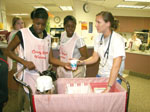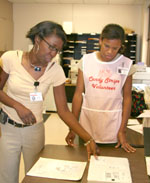
Return to Main Menu
|
Program enlightens youths to health
care
by
Chelsea Futterman
Public
Relations
The term “candy striper” comes from the red and white striped pinafores
that were traditionally worn by young, female hospital volunteers in
the 1940s. Today, you may see the revived red and white striped
uniforms on teenagers walking the halls of the medical center as part
of the new MUSC Candy Stripe Program.
“The candy stripe uniform is really noticed by patients and visitors,”
said Katy Kuder, Volunteer Services manager who oversees the program.
“Employees, patients and visitors love the concept, and tell me so
often.”
 Candy stripe
volunteers (from left) Kaitlyn Waiboer, 15, Afrika Palmer, 14, and
Biana Gamble, 14, provide a needed break with the tea cart to
registered nurse Jenny Peterson, 7W, orthopaedics/trauma. Candy stripe
volunteers (from left) Kaitlyn Waiboer, 15, Afrika Palmer, 14, and
Biana Gamble, 14, provide a needed break with the tea cart to
registered nurse Jenny Peterson, 7W, orthopaedics/trauma.
But the program, which began in February, is much more than uniforms,
and it’s not just for girls anymore. It's about recruiting young people
into the heath care field.
“The goal of the program is to open the door of opportunity to the
young people of our community to the possibility of a health care
career,” Kuder said. “And it’s working.”
Shanica Bennett, a rising sophomore at Stratford High School who
currently volunteers at the hospital, is considering a career in
medicine. “I hope this volunteer experience will help me decide,”
Bennett said.
Another volunteer is Mira Patel, daughter of Sunil Patel, M.D.,
clinical chair of MUSC’s Department of Neurosciences. Mira, 15, was one
of the first candy stripers who began volunteering last February. She
expressed interest in becoming a pediatrician and chose to volunteer
for the experience in health care.
She is still with the program and volunteers each weekday for four to
five hours a day. When she turns 16, she plans on volunteering in the
Children’s Hospital.
The Candy Stripe Program at MUSC began as an after-school project in
partnership with Ashley Hall, a private girl’s school located nearby
from which 20 girls began volunteering in mid-February. Now, the
program is in full swing and includes more area schools with two
four-week summer sessions. Close to 80 girls and boys ages 14-18
have participated in the summer sessions. Many of the participants also
earn community service credits required for graduation.
 Volunteer Services
manager Katy Kuder walks candy stripe volunteers to their department
orientations. Volunteer Services
manager Katy Kuder walks candy stripe volunteers to their department
orientations.
Thirty-four students representing 15 different high schools
participated in the first session, June 18 to July 13. For the second
session, which began July 23 and ends Aug. 17, 49 students signed up,
seven of whom are returning students from the previous session.
Gina Sciarro, program coordinator, said the program has done
exceptionally well. For the month of June, MUSC volunteers contributed
more than 3,177 hours of volunteer time, she said.
“Compared to last year in June when we only had about 1,982 hours, this
is very impressive,” said Sciarro, who expects volunteers will have
worked even more hours in July and August. Sciarro already is planning
to add another session for next summer.
Each department has established job descriptions for the candy
stripers, which provide a variety of insight for them into health care;
administrative and clinical.
“We get great feedback from the departments,” Sciarro said. “The
representatives, who orient the candy stripers, are really appreciative
and they make the students feel very welcome.”
The tea cart is a favorite among employees and regularly goes to all
nursing units in the main hospital serving the staff tea, coffee and
treats.
“I loved how when I served tea everyone was so happy to see me,” said
Mira, who is a sophomore at Ashley Hall. “They would say I brighten up
their day.”
 Antoinette Bowman,
Mail Services administrative assistant in the Institute of Psychiatry,
shows candy stripe volunteer, Leah Snipe, 15, what to do with received
packages and how to locate where they need to go. Antoinette Bowman,
Mail Services administrative assistant in the Institute of Psychiatry,
shows candy stripe volunteer, Leah Snipe, 15, what to do with received
packages and how to locate where they need to go.
The candy stripers come in twice a week for eight hours each day. They
get to choose their two days and what assignments they want. The list
of available job assignments and departments include cafeteria dietary
hostess, patient transporter, Institute of Psychiatry mailroom
assistant, central supply, Storm Eye Institute clinical flow assistant,
Infection Control and Rutledge Tower Radiology, and the tea cart.
The program requires students to attend orientation before they start
volunteering. The orientation lasts an hour, during which time Kuder
reviews
the rules and responsibilities of working in a hospital.
“I emphasize the importance of completing each assignment, leaving a
good impression with patients and families, and being flexible and
accommodating,” Kuder said. In addition to the orientation, students
must also complete the OSHA (Occupational Safety and Health
Administration) training program and receive a tuberculosis skin test
just as all other MUSC employees do.
The Candy Stripe Program is somewhat of a revival of MUSC's previous
Teen Volunteer Program, which required a commitment of 40 hours during
a calendar year. Under that program, teens held the same types of
volunteer positions as their adult counterparts. Because it lacked
clear guidelines for the younger volunteers, it was canceled three
years ago. Kuder and Sciarro reviewed programs used at other hospitals
inside and outside of South Carolina and used the best practices at
each for the new MUSC program.
Friday, Aug. 3, 2007
Catalyst Online is published weekly,
updated
as needed and improved from time to time by the MUSC Office of Public
Relations
for the faculty, employees and students of the Medical University of
South
Carolina. Catalyst Online editor, Kim Draughn, can be reached at
792-4107
or by email, catalyst@musc.edu. Editorial copy can be submitted to
Catalyst
Online and to The Catalyst in print by fax, 792-6723, or by email to
catalyst@musc.edu. To place an ad in The Catalyst hardcopy, call Island
Publications at 849-1778, ext. 201.
|


